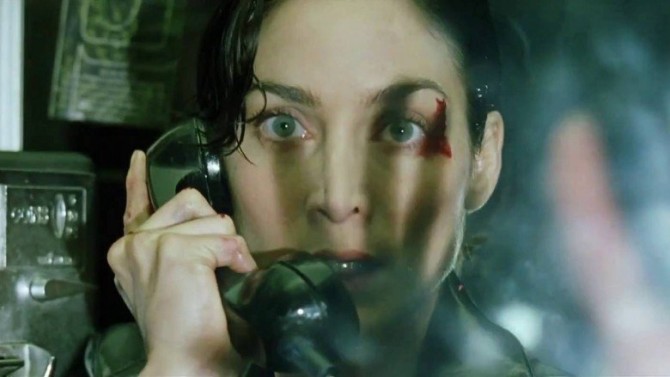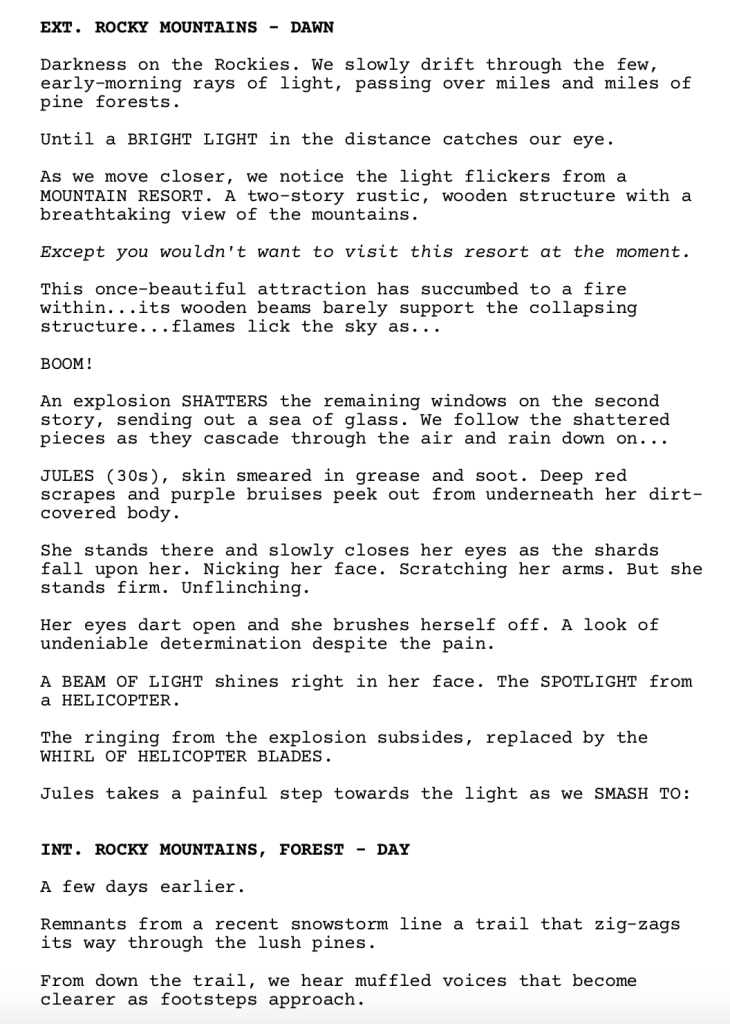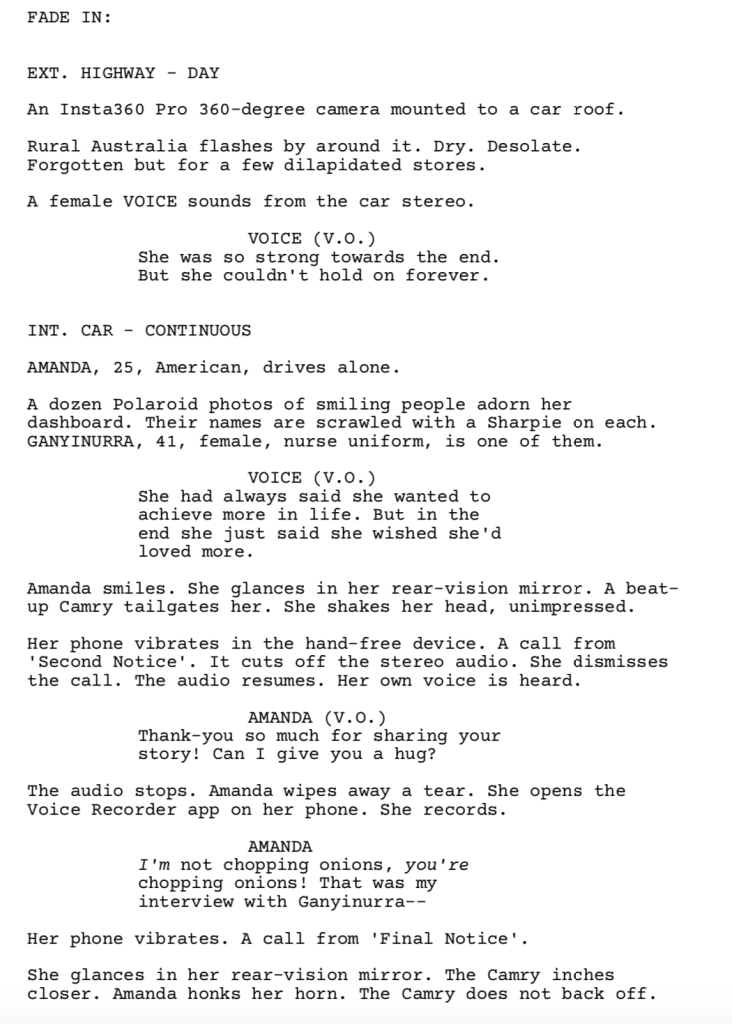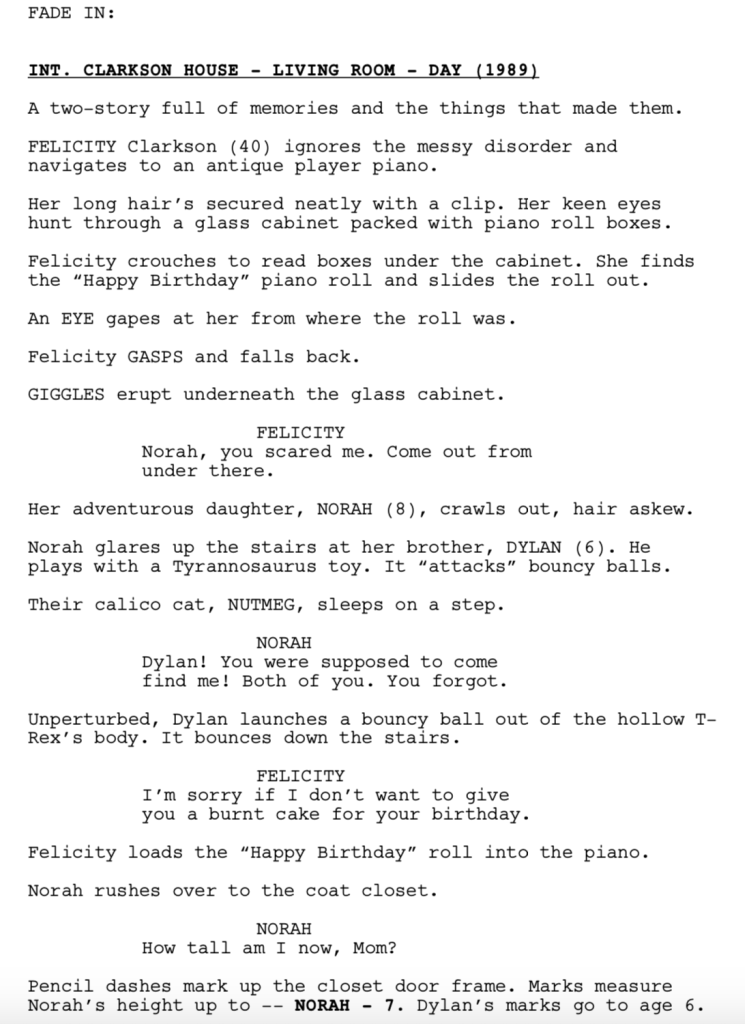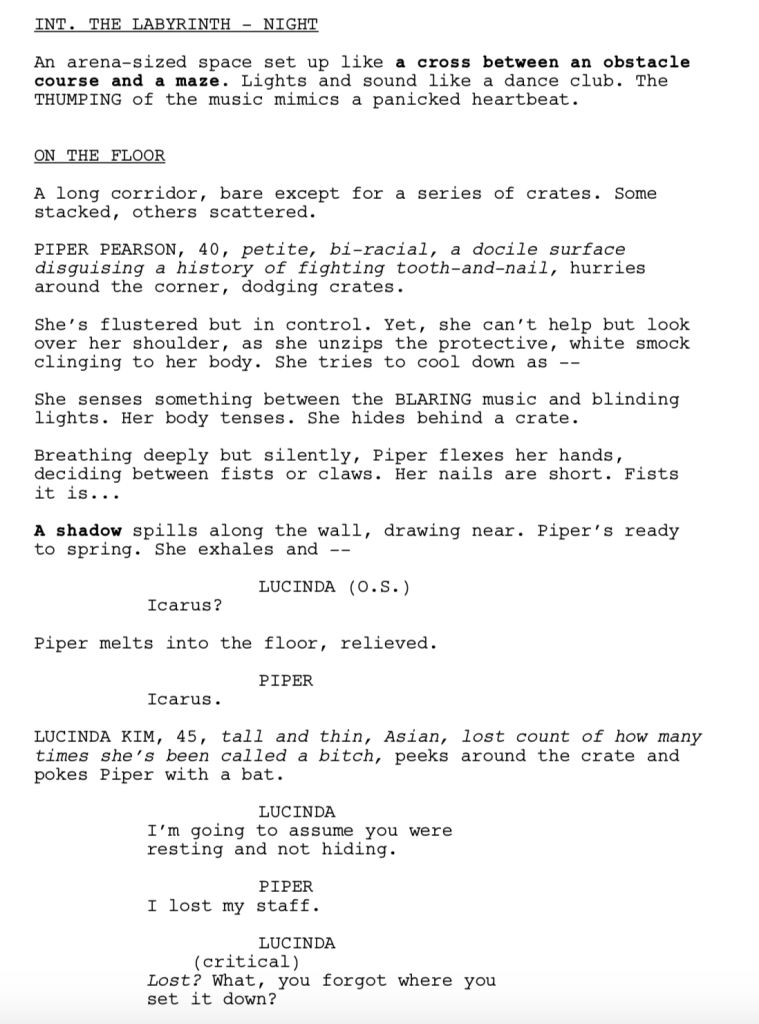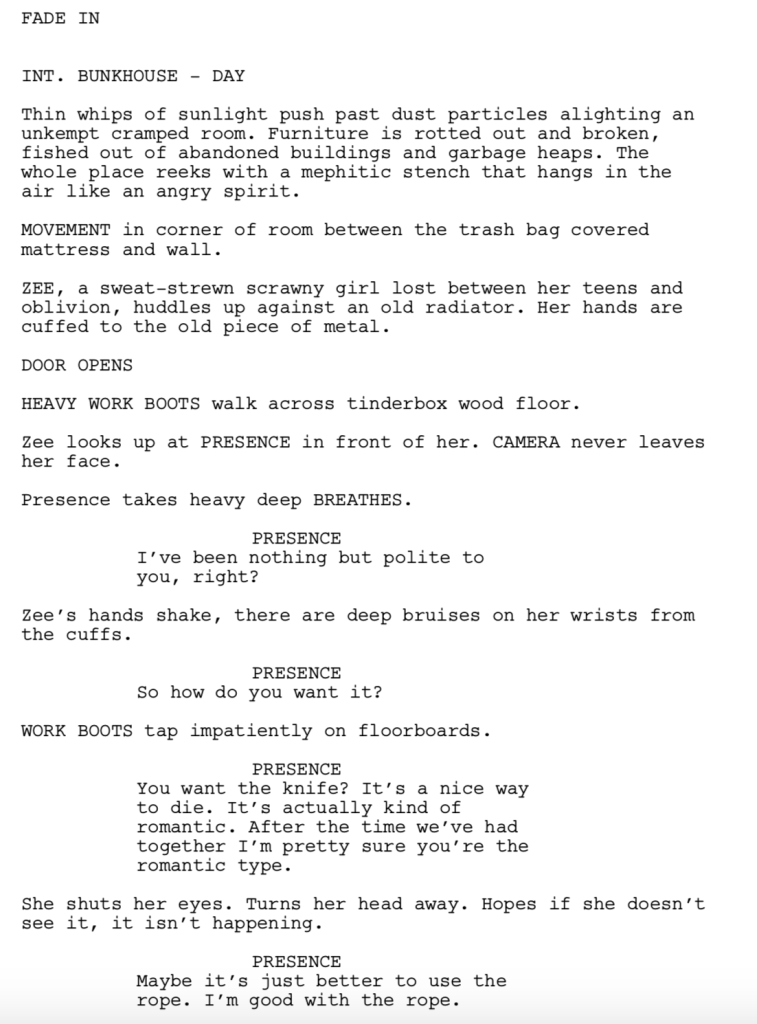Search Results for: F word
When you’re writing a screenplay, every little thing counts. Even spelling words correctly counts. So if you can make your script 1% better by adding a cool plot development on page 40, you do it. And if you keep doing that over and over, making little improvements here and there? Before you know it, your script is pretty darn good. But improvement take time. Heck, writing takes time. So I got to thinking, how could I help you guys significantly improve your current script in as short a period of time as possible? That’s how we got this article. Here are a handful of things you can do to make your script a full 25% better THIS WEEKEND. Enjoy!
Write a Better First Scene
Improvement Potential: 8%
Implementation Time: 3-5 hours
I want you to go read the first scene in your script right now. I’ll wait. Now I’m going to ask you a question. Is that the best you can do? Because I’m going to go out on a limb and say it’s not even close to the best scene you can write. Screenwriting is challenging in that there’s a lot of things you have to do at the same time. Set up characters, provide exposition, write strong dialogue, start the scene as late as possible, end it as early as possible, blah blah blah blah blah blah blah BLAH BLAH BLAH. Blah. You shouldn’t be thinking about any of that stuff in your first scene. The number one thing you need to be focused on in that scene is ENTERTAINING THE F#%@ OUT OF THE READER. So write a scene that entertains. Yes, hopefully you’re setting up character. Yes, hopefully you’re setting up plot. But if at any point in the opening scene you have to make a choice between entertaining and anything else, choose entertaining. Cause we’re not going to keep reading unless we’re enjoying ourselves.
Eliminate Your Three Most Boring Scenes
Improvement Potential: 3%
Implementation Time: 2-4 hours
It is a rare script reading experience where I say, “Man, this is all going by too fast.” It’s more often the opposite. “Oh my God, this script is so sloooooowwww.” There are many reasons your script might be reading slow but one of the most common is that you’re adding scenes you don’t need. These scenes aren’t pushing the story forward in any significant or entertaining way. The solution to this is simple. Get rid of them! You probably already know the weakest scenes in your script but do a quick skim, note your three most boring scenes, then drop them. If there’s plot or character information in those scenes that are required for the story to work, move them to other scenes. Pro Tip – You’ll find most of these scenes in your second act.
Just Raise The Stakes Man
Improvement Potential: 5%
Implementation Time: 9-12 hours
A big reason why so many screenplays are boring is because there isn’t enough on the line. Whatever your hero’s journey is, make sure there are genuine high stakes attached to it. Yesterday, a lot of you liked my plot suggestions to improve First Harvest. All I did was raise the stakes. Here was a man who was struggling to take care of his dying wife. He’s given this baby to take care of after a local tragedy. The baby has powers. The baby causes a few hiccups around the farm but that was it as far as stakes. I changed it to: the hero *secretly* takes the baby, the baby’s powers begin healing his wife, and the FBI starts looking for the baby. The Feds taking the baby means losing his wife. What is all comes down to in writing is making the reader care. If they care, you’re good. And one of the best ways to make someone care is to increase what’s on the line. One extra point about this. There’s a sliding scale of effectiveness with this tip the more uninspired or generic the stakes are. For example, your hero has 12 hours to deliver a package or the bomb in his head blows up. Sure, there’s a lot on the line, but it’s so artificially orchestrated, so “basic action movie setup,” we don’t feel anything. You want to come up with your stakes in a way that’s creative and organic to the story. If you nail this, every single scene in your script becomes better because you’ve raised our overall investment in the character’s journey.
Give Your Hero the Best Save the Cat or Kick the Dog Moment You Can Come Up With
Improvement Potential: 5%
Implementation Time: 90 minutes – 3 hours
You guys hear about that tiny movie that came out a couple of months ago? “Joker?” The first character piece film to make a billion dollars at the box office? Do you know why that movie made so much money? Because of its Kick the Dog scene. Here Arthur is, dressed in his clown suit, advertising for a store, doing his best to bring joy and happiness to the world, and then a bunch of thugs steal his sign and beat him to within an inch of his life with it. After that moment, after getting kicked by the dog, we feel MASSIVE SYMPATHY for Arthur. Which is why we care so much about his journey. Even when he goes all psycho killer Qu’est-ce que c’est on everyone. Okay okay, maybe that’s not the ONLY reason the movie made a billion dollars. But it was a critically important introduction to the character that shaped our feelings towards him. And that’s what a good save the cat or kick the dog scene can do for your hero. So come up with the best one you can think up and write it. I promise you it will pay huge dividends down the line.
Give Us One Set Piece We’ve Never Seen Before
Improvement Potential: 4%
Implementation Time: 4-5 hours
The best scripts I read almost all have one thing in common – A great set piece scene I haven’t read before. You should think of your set pieces as commercials for why your concept is so awesome. For that reason, they shouldn’t be standard generic car chases or shootouts or explosions. They shouldn’t be that scene that’s in every 200 million dollar movie now where a plane starts falling apart and everyone flies out. They should be creative and original and unique. Take A Quiet Place. What’s a commercial for a movie about not being able to make noise or else you’re killed? A wife giving birth. Who can give birth without making a noise? Or say you’re writing a movie about Hollywood in 1969. What’s a commercial for that setup? A mini-horror movie about trying to see an old friend on the Manson farm with 50 crazy cult followers in your way. The Wrestler. A former star wrestler working at a deli has a mental breakdown in front of all the customers. You can usually figure out these scenes by asking what’s unique about your concept and then building a scene around that. If you nail one of your set pieces, that’s the scene people will leave the theater talking about. So it’s important you come up with the best set piece you can possibly come up with.
Happy Writing this weekend!
Carson does feature screenplay consultations, TV Pilot Consultations, and logline consultations. Logline consultations go for $25 a piece or $40 for unlimited tweaking. You get a 1-10 rating, a 200-word evaluation, and a rewrite of the logline. They’re extremely popular so if you haven’t tried one out yet, I encourage you to give it a shot. If you’re interested in any consultation package, e-mail Carsonreeves1@gmail.com with the subject line: CONSULTATION. Don’t start writing a script or sending a script out blind. Let Scriptshadow help you get it in shape first!
You still have until tomorrow (Thursday) night at 8pm Pacific to enter your action spec for Amateur Action Showdown!
One of the most frustrating things about pursuing screenwriting for a majority of people is screenwriting contests. A lot of these feel like a crapshoot. Who knows who’s reading your script. That horror script you wrote that’s going to make IT’s box office look like Charlie’s Angels could end up in the hands of someone who detests horror movies. And who knows what order a reader reads your script in. Is it his second script of the day, where he’s alert and hopeful? Or his sixth script, where he’s exhausted and thinking about the three chalupa special at Taco Bell? And the whole thing just seems so SUBJECTIVE amirite? Does the best script win? The best idea? The most woke socially conscious biopic concept? Navigating this world can be equal parts frustrating and depressing. But I’m here to help you do better in these masochistic merry-go-rounds of mayhem. With a few tips and the right outlook, you’re going to start seeing results. Let’s get to it!
1) Most screenwriters enter contest scripts that aren’t ready – Look, I’m all for deadlines. Without deadlines, I’d never post anything on this site. But there’s a difference between a realistic deadline and a deadline where all you’ve done is put words a page. Nobody is going to give you points for getting a messy rushed script in on time. And I was guilty of this too. I would use the Nicholl deadline to finish a script and literally send the script on the final date at the last mailing pickup time of the day. And then I’d be mad when my script didn’t win. You are up against 100 to 7000 other scripts in a contest. Do you really think your rushed first draft of a script is going to do well? Nicholl gets rich off of people like you. While story will always be subjective, sloppiness is not. I want you to tattoo what I’m about to say to the inside of your eyeballs because it might be the best advice you’ve ever received: Contests are not about showing the world that you can write a screenplay too. They’re about writing something that STANDS OUT from the pack.
2) Tell a great story with your first scene – While contests are different from “real life” in that the reader will read the entire script, that doesn’t mean they’ll pay attention the entire script. If they’re not impressed with your first scene, their overworked reader brain will switch into skim-mode. Notice I’m giving you a very specific directive for the first scene. I’m not just saying, “Write a great first scene.” I’m saying: “Tell a story.” In other words, hook the reader with something, then make them have to keep reading the rest of the scene to find out how that hook concludes. A female hacker must escape a group of men who have come to capture her (The Matrix). A man calling a babysitter and telling her he’s going to kill her then hanging up (Scream). A man wakes up on a train with no idea why he’s there or who he is (Source Code). The reason to do this is because it’s one of the easiest ways to pull someone in quickly. And contests readers are exhausted so you want to pull them in quickly.
3) Professional presentation – Correct formatting, no misspellings, no grammar mistakes, no punctuation mistakes, no light text from cheap screenwriting programs, no ultra-wide dialogue margins, no “condensed” mode to turn your 130 page script into a 110 page script regardless of the fact that all the lines overlap each other vertically. This one seems obvious but as someone who’s read a lot of amateur screenplays, I can tell you that a lot of you who think you’re being professional aren’t. If you’re someone who has written under three screenplays, you are probably making some mistakes in your presentation. Become OCD about your presentation. It’s one of the most reliable ways for us readers to spot bad scripts.
4) Your dialogue is thin, obvious, and on the nose – While there’s plenty of debate about what constitutes the difference between good and great dialogue, everybody knows what bad dialogue is. Bad dialogue is characters saying exactly what they’re thinking in simplistic uncreative ways. It is characters espousing exposition like robots. It is characters who are speaking directly to the reader as opposed to the other character in the scene. It’s a long road to become good at dialogue but the starting point is your characters. If the characters are fun talky types, they’re going to have more interesting dialogue. If you know the character well, you’ll be able to write more specific dialogue for them (example: If you know your character once lived in France, they may occasionally throw a French word into a sentence). And if you know how to inject conflict into a scene, your dialogue will improve exponentially.
5) Know your audience – There’s an old documentary with Vince Vaughn where he takes a group of young comics out on the road to do stand up. One of Vince’s comedian’s central bits was about how real men don’t wear sandals. At their first show, he went on about how sandals are for wussies. The problem? They were at a Colorado college campus where 90% of the college men in the audience were wearing sandals. The boos from that crowd still echo in his ears to this day. What’s the lesson here? STOP SENDING GENRES TO CONTESTS THAT DON’T CELEBRATE THOSE GENRES. The Nicholl doesn’t celebrate horror scripts just as The Tracking Board doesn’t celebrate two American Indians trying to start a rug business in 1865. You live in the age of the internet. Do not send your script ANYWHERE until you go to their website and find out every script that has won and placed in their contest for the past five years. You’re going to save yourself a lot of wasted money. Trust me.
6) Contests tend to reward ingenuity – Most scripts read like every other script. The contained thrillers, the biopics, the Westerns, the guy with a gun, the buddy cop, the heist movie. There isn’t anything wrong with writing one of these scripts and executing it well. You can start a career with a great version of any of these genres. But in contests, these scripts blend into the background because they’re so common. The scripts that rise up tend to be those that try something different. For example, Shimmer Lake, which won Austin years back and later became a Netflix movie. That was a mystery that was told backwards. Stuff like 500 Days of Summer. Or yesterday’s and Tuesday’s scripts. There’s so much of the same in these contests that you stand out with a creative storytelling take.
7) You need at least 5 contests (with a single script) to know where you stand – A single contest not liking your script isn’t enough to identify where the script is or where you are as a writer. There are too many variables involved. However, if you send your script to five contests and it doesn’t advance in any of them (even to the second round), there’s likely something wrong with THE BASICS OF YOUR SCREENWRITING. We’re talking bad presentation, a huge page count, a vague concept, misspellings and grammatical errors, not understanding the basics of scene-writing (beginning, middle, end), lack of clarity in the writing, an inability to set up your hero effectively, no concept of what conflict is or how to use it. Good screenwriters have all the basics down. If you’re not advancing at all in contests, I can almost guarantee you it’s because you don’t know all of these things. So learn them and get back in there with your next script.
8) If you’ve written more than six scripts and still aren’t placing in any contests, GET FEEDBACK – I know I’m expensive so you don’t have to use me. But find SOMEBODY who understands screenwriting and can be honest with you. Otherwise you’re flying blind. You have no idea what to work on or what to improve. About five years ago, this writer came to me with this very problem. He’d been writing for 15 years and had never placed in a contest before. So he ordered a consultation and his script was this completely zany out-there concept. It was so weird. Out of curiosity, I asked him to send me the loglines for his previous five scripts. They were all really weird and out-there. It would be the equivalent of writing Armageddon and adding a cannibal storyline where one of the cannibals was a ghost. I said to him, dude, you’re all over the place. You need to simplify your concepts and stop trying to be so zany. And the next script I read from him was a major improvement. And he admitted to me that he would’ve never known his ideas were too weird had he not gotten feedback. He had been told early on that you have to write something that’s unique to get people’s attention and he mistakingly took that advice and applied it 1 million percent. The point is, you could be making the most obvious mistake with your script but if you don’t get feedback every once in a while, you’ll never know.
9) If you’ve consistently placed in contests (top 10 or 20%) but can’t get any further, you’re probably in one of two positions – a) You’re extremely talented but raw. Half your script has flashes of Tarantino but the other half feels like a compilation of Donald Trump’s tweets. b) You’re a screenplay technician who’s mastered the formula, but your script lacks big risks and stand out moments. There’s not enough creativity in your storytelling. If you’re the former, put aside six months and learn the nuts and bolts of screenwriting (especially structure). If you’re the latter, watch all of the weirdest (good) movies you can find and study the choices the screenwriters make that result in such a unique viewing experience.
10) Your script is only going to be as good as its concept and main character – Lame uninspired concepts do not turn into good scripts. Boring/weak/lame main characters don’t all of a sudden become interesting on page 90. You can be a good screenwriter but if you’re entering contests with one of these two problems, your script isn’t going to do well. Period.
I hope this was helpful. Leave your favorite contests in the Comments Section and I’ll put together a master list here.
SO FAR
Nicholl
Austin
Page
The Tracking Board
Genre: Horror
Premise: A mysterious drifter gets stuck inside a Chuck E. Cheese like entertainment center called Wally’s Wonderland where the animatronic creatures come alive and kill.
About: It’s here. The single greatest Nic Cage movie that hasn’t been made yet. Wally’s Wonderland! An idea so fun it seems impossible no one’s come up with it yet. I guess the universe needed the idea to collide with a certain Direct-to-Digital icon before it was ready to unleash the greatest midnight horror film ever… that hasn’t been made yet. I read somewhere that the writer wanted to make “the ultimate B movie that was so absurd you had to tell your friends about it because of how stupidly awesome it was.” I admire a writer who knows exactly what he wants.
Writer: G.O. Parsons
Details: 93 pages
When one reads Wally’s Wonderland, one has to ask the question: “Will this be the greatest B-movie ever made?”
Nick Cage taking down an animatronic ostrich with a mop could be this generation’s cut yourself out of the inside of a shark with a chainsaw moment.
I can tell you something this script taught me right off the bat. It’s in reference to idea creation. There are big news stories in our pasts that just sort of came of nowhere and everyone talked about them. Then, just as quickly as they arrived, they disappeared. If you can identify one of these stories and find a movie idea for it, you’ve got something that already has “concept cache” because it’s been proven to capture peoples’ interest.
I remember those news stories about how pedophiles and sickos used to hang out at Chuck E. Cheese because that’s where all the kids were. Today’s script has taken that idea to the next level, centering around a group of these degenerates who sacrificed their souls in order to live on in animatronic form.
The Janitor is driving his jeep down a lone highway in Middle-of-Nowhere Nevada when, all of a sudden, all four wheels blow out at the same time, bringing him to a screechy scary stop. And yet the Janitor is unphased. By the way, it’s never clear if The Janitor is named The Janitor because he *is* a janitor or because he must become a janitor due to his circumstances. Such details are unimportant in Wally’s Wonderland.
A tow truck shows up and a man named Jed explains to The Janitor that the police were chasing someone the other week, put out one of those spike lines to blow the guy’s tires, and, wouldn’t you know it, forgot to recollect it! He takes The Janitor back to his garage where he gives him the damage – $1000. Unfortunately, Jed informs him, they don’t take credit cards. It’s clear that The Janitor doesn’t have cash on him so Jed offers an alternative.
Cut to Wally’s Wonderland, a long since closed-down Chuck E. Cheese knock-off. The owner, Tex Macadoo, is planning to reopen the place. But he needs someone to clean it up first, make it spick-and-span. If The Janitor is quick, Tex tells him, he should be able to finish the job by morning. The Janitor hasn’t said a word to anybody yet. He doesn’t even react. He just stares intensely at whoever’s talking to him.
Wally’s Wonderland is a freaking mess. Remnants of hundreds of sad 1990s birthday parties are scattered about haphazardly. And then there’s those rusty creepy animatronic dolls (Pirate Pete, Beary the Bear, Ozzie the Ostrich, and Wally the Weasel) up on stage. They stand there staring out at nothing. Or at least that’s what we think. What The Janitor doesn’t know is that Jed and Tex have locked him in the building. He’s about to be sacrificed to these animals… which are very much alive!
The first one, Ozzie the Ostrich, strikes almost immediately. But a strange thing happens when he attacks. Unlike the other humans who freak out and run and scream for their lives, The Janitor just stands there waiting for the Ostrich and then cracks him in the face with his mop. He then relentlessly beats him to a wirey pulp.
You’d think that after an animatronic Ostrich tried to kill you that you’d prepare for battle with the other three fake animals in the room. But not The Janitor. He simply goes back to work, determined to clean the place up before dawn.
Meanwhile, a group of high school kids led by a girl named Liv head to Wally’s World to burn it down. They know the town sacrifices people in there and they’re going to put a stop to it. But first they have to get The Janitor out of there. So they head up to the roof where they’re able to gain access inside. Once in, however, things don’t go according to plan. The animatronic animals are more than happy to fatten up on young human flesh.
Strangely, The Janitor doesn’t care. He really really really wants to clean. Unless a kid being eaten is directly in the way of doing his job, he ignores them. It’s not clear whether The Janitor doesn’t realize he’s been conned or if he knows he’s been conned but still wants to clean the place. Either answer is acceptable to me.
You know where this is headed. The whole time, Wally the Weasel has been sitting atop his stage perch, awaiting all his other minions to take their shot at the Janitor. And when they fail, he must now get the job done himself. Nicholas Cage……….. vs. a 9 foot animatronic weasel. I’m going to ask you an honest question. Do you even need to go on with life after this battle? Cause I don’t think I do.
One of the first things I wondered before reading this was how is Nicholas Cage going to fight animatronic monsters for 90 minutes inside of five rooms? I was worried the flame was going to burn bright then go out before the second half.
So I liked what Parsons did. He brought in these high school kids. Not only did that give us more battles to show, but The Janitor plays an Equalizer-like character. He handles every attack with ease. So we needed characters who STRUGGLED to defeat these things to make it more interesting. Remember, that’s where you grab the viewer – when things are unknown. If we know our heroes are going to win every fight, there’s no conflict, there’s no uncertainty, and therefore there’s no tension. Bringing those kids in was key.
Also, if you have a character who’s as unstoppable as The Janitor is, you need to look for ways in the second half of the movie to handicap them. That way they don’t have access to their fighting superiority and you DO get uncertainty in their fights. When the town realizes that The Janitor is winning, they go back in, handcuff him, and leave him there so that he can be properly sacrificed. So now The Janitor has to fight with his hands tied behind his back! That’s smart screenwriting.
It also helps, in movies like this, if you can occasionally take us outside. Technically, you can keep everything inside. It’s certainly cheaper to do it that way. But even in script form, there’s a “claustrophobic” feeling that sets in if you’re not occasionally cutting away from the place. So it was good that we’d occasionally cut back to the bad guys. We even get one great scene where the bad guys are driving away only to see an animatronic penguin bash through their windshield and attack them.
This also allows you to cut out boring stuff. If we stayed inside the whole time, we’d have to show The Janitor after he killed someone or washing his hands or doing other boring things. By occasionally cutting outside, we could cut back to the Janitor all set up in a new spot to clean. It’s an aspect of screenwriting I don’t talk about much because it’s unsexy. But the advantage of cutting away to anything is that you can then jump forward in time to a story-convenient plot point once you come back to your A-story.
The only thing I’d probably change here is to have a little more fun with the animals’ personalities. Each animal should have a distinct approach and style and way they talk. This is a stupid example but if there was someone named “Cheaty Cheetah,” he might talk really really fast. Disney movies are good at this. In Zootopia, there was that scene at the DMV and they were stuck with a sloth who spoke at -50 miles per hour. This is such an absurd premise that you might as well lean all the way into it.
Either way, I had a lot of fun with this and I hope they figure out a way to have midnight showings in Los Angeles because that is exactly how this movie is meant to be enjoyed.
[ ] What the hell did I just read?
[ ] wasn’t for me
[xx] worth the read
[ ] impressive
[ ] genius
What I learned: Handicap your hero as the script goes on! Whether your hero is as capable as Denzel Washington in The Equalizer or as outmatched as Bruce Willis in Die Hard, look for ways to handicap them as the story goes on so that their job gets tougher. The tougher it is, the more we’ll doubt they can succeed. That’s where you want your audience. You want them thinking, “There’s NO WAY they can pull this off.”
Currently one of the best writers in town, Taylor Sheridan is back with another spec that’s expected to start a major franchise.
Genre: ACTION/CRIME
Premise: A former delta force operator is given a unique opportunity by the DEA to take down drug dealers without any oversight.
About: Can life get any better for Tyler Sheridan? The writer of Hell or High Water, Sicario, and Sicario 2, as well as writer-director of Wind River, recently moved into TV, where he took a project that wasn’t on anyone’s radar, Yellowstone, and turned it into a surprise hit. F.A.S.T doesn’t seem to be following the same narrative, unfortunately. Sheridan was in negotiations to direct it with Chris Pratt attached to star, but those negotiations broke down and the studio brought Gavin O’Connor onto the project. Since that point, it’s unclear if Pratt remains on F.A.S.T. But a new Sheridan spec is always a big deal so I’m excited to find out about it today.
Writer: Taylor Sheridan
Details: 132 pages
I think Taylor Sheridan is one of the best writing successes of the last five years. There are hundreds of thousands of fellow actors writing screenplays. He rose above them all by putting emphasis on the things he knew best – character development and modernizing old-fashioned subject matter like cops and robbers.
The way breaking in works is that you go at screenwriting for a while until you finally write something that people like. Then everyone in Hollywood wants to work with you. Because you’ve been at this for so long, you have 2-3 scripts in the hopper that are almost there. These scripts allow you to keep the momentum going.
But once you get past those scripts, you’re writing from scratch. Now, theoretically, you’re a better writer so you should be able to write a good script faster. But the reality about screenwriting is that you need drafts. No matter how good you are, it takes half-a-dozen drafts before you even start to find your story. This is what famously happened during the writing of The Sixth Sense. That script started off about a boy who drew spooky images about a killer and ended up being about a kid who saw dead people and the psychologist who helped him.
All this is to say that the well appears to be drying up for Sheridan. His first couple of scripts were great. But Sicario 2 was a narrative mess. It was the first script where I thought, “He’s rushing this.” And I’m not mad. Look, you don’t know when the Hollywood truck of money no longer wants to pay you a visit. So you have to capitalize when you’re hot. But I’m worried that Sherdian may be biting more than he can chew. Let’s hope I’m wrong.
Kyle is a former delta force operator in the Middle East. But ever since he’s been back in Baltimore, he can barely make ends meet. His wife and two kids are tired of living in a garbage tract house. If something doesn’t change soon, he’s not sure he’ll be able to keep it together.
One day while bringing his kids home from school, Kyle spots two skinheads – who live on his block no less – carrying his TV and furniture back to their house. Kyle has his kids wait at home then goes over to get his effing stuff back. As often happens with skinheads, things escalate, and within seconds, Kyle’s killed both of them.
Kyle calls his old commander, Sheel, who now works for the DEA, and Sheel comes over to help him clean up the mess. They learn that the skinheads were drug dealers in the area. In a roundabout way, they just helped the community.
This gives Sheel an idea. You see, it’s impossible to get anything done at the DEA. There’s a thousand miles of politics and red tape. So what if you just… didn’t have to worry about that? In the Middle East, the CIA used to run a program called “F.A.S.T.” that didn’t have any laws. If you wanted to take the bad guys out, you just went to their house and did it. Sheel wants to do the same thing, but for drugs. And he wants Kyle to run it. The upside is that Kyle gets any money he finds at the houses.
There are rules, though. You can’t kill anyone. You seize drugs and money and then leave. That’s going to require a very skilled team, Kyle says. “You can use anyone you want,” Sheel replies. Kyle gets some of his best men back together and after carefully prepping their plan, they begin their operation.
The first job goes so well that they keep doing them, and within a week, they’ve done more damage to the local drug trade than the DEA has in 10 years. They’re so good at what they do that word travels to the higher-ups, who want them to take on a higher profile job – IN TURKEY. The group is flown out to Turkey where they’re going to be facing the biggest drug kingpin in the entire country. Will they make it out alive? What do you think?
To answer my earlier question – Sheridan is back!
It’s hard to figure out exactly what Sheridan does better than everyone else. Because when you take a step back and look at his screenplays from afar, they don’t seem that special. They’re covering territory – SWAT, DEA, CIA – that are so often used in movies that they’ve become cliche. And yet he’s clearly better than everyone in this genre. So what’s his secret?
The answer very well may be in the opening scene. When I read any script where a character is a vet, they always have post-traumatic stress syndrome. They’re all having trouble adjusting back into society. The ubiquity of thier condition destroys any weight it may have. The only way you break through that wall is by individualizing the character’s experience. You give them something that sells their PTSD in a way that separates them from characters in other scripts. That separation is what makes us believe they’re real.
Here, Kyle is engaged in a therapy session with a military psychiatrist. She’s asking him how he’s been doing. Kyle is trying to say all the right things. But between answers, we’re getting quick flashbacks to his time in the Middle East. He’s inside a moving van where ISIS members are taping an attempt to decapitate him. He’s only barely able to get out alive. The psychiatrist asks another question. He answers with, “I’m fine,” and we get another flashback with him casually chatting with a soldier while walking through a city and then an IED evaporates his friend. Back to therapy.
There was something about this three-pronged attack of a therapist asking him questions, him denying anything was wrong, and a flashback that proved the opposite, that sold me that this was a real vet and not that paper-then “vet in name only” character I typically see in scripts. In other words, Sheridan finds a way to sell you on his characters so that you care more about what happens to them.
And he’s so smart about it. Like the way he updates old screenwriting tricks. “Save the Cat,” for instance. The idea behind saving the cat is to get your character to do something nice for/to someone and, once the audience sees that, they’ll like the character. The problem is most screenwriters’ approaches aren’t imaginative enough to create an authentic moment. They’ll just have the hero pass a homeless man five bucks and call it a day.
But Sheridan realizes that “saving the cat” is a much broader tip than merely being nice. It’s anything that makes us like the character. The “save the cat” moment in F.A.S.T. comes when Kyle is bringing his kids home and sees a couple of skinheads walking his TV and furniture back to their house. He puts his kids in a safe room under his garage and walks over, puts a gun to the skinhead’s face, and tells him they’re going to pick everything back up and walk it right back to his house.
The reason we like this is obvious when you think about it. Skinheads are bad. We don’t like people who take our stuff. And therefore, we love anyone who’s willing to stand up to those people. Because, in our lives, we wouldn’t be able to do that. This man represents who we wish we could be.
There’s nothing you can do in a script that pays more dividends than a character people love. You could be an average writer but if you’re great at that one skill, you can go a long way in this business.
The other thing Sheridan does that makes him different is he finds these little cracks inside well-known subject matter and builds stories around them. So he doesn’t just tell a story about the CIA. Or the DEA. He creates a division within them – a totally new type of team that does a very specific job in “F.A.S.T.” You might be sensing a theme here. Sheridan looks for small ways to make his script different than all the other scripts out there. He knows that generic won’t cut it.
Problems? Sheridan sometimes adds one extra plot beat late in the second act that draws the narrative out too long. He did this with Sicario 2 and he’s doing it here as well. Late-story pacing is crucial to driving a script home. If you linger too long in plotlines that don’t matter, you risk the audience’s attention drifting away like dandelion strands on a late August afternoon. That’s the section you gotta keep tight and, despite its title, F.A.S.T. feels slow in that area.
Still, this fortifies Sheridan as one of, if not THE, top gun in this genre. I can’t think of any other writer who does it better in 2019. Can you?
[ ] What the hell did I just read?
[ ] wasn’t for me
[ ] worth the read
[x] impressive
[ ] genius
What I learned: Dealing with emotion in screenwriting is challenging. It’s easy to oversell it, and when that happens, the moment feels cliché or on-the-nose. When I read the line, “A single tear falls down his/her cheek,” in a script, I literally throw up inside of my mouth. Which is why I’m happy to show you someone who tackles this issue successfully. Here, Kyle is being interviewed by a therapist and she gives him a rorschach test and asks what he sees. He struggles to come up with an answer, and then Sheridan writes this: “He stares at it and smiles, as his eyes well with tears ….” Why is this better than “a single tear falls down his cheek?” Because the reaction is more complex. He smiles WHILE fighting tears away. There’s contrast in reaction (two contrasting things are going on at once) which is way more honest, and therefore, a lot more authentic.
First of all, I want to thank everyone who sent a submission in for Halloween Amateur Showdown. I got a lot more submssions than I thought I would.
BUT!!!
I have to take a moment to plug my logline service (e-mail me at Carsonreeves1@gmail.com with the subject line “logline” for a consult). So many of these submissions shot themselves in the foot due to terrible loglines with fixable issues. If you’ve never received instruction on how to properly write a logline, you should seriously consider a consult. The basic option is just $25 and the deluxe is $40. And, trust me, you’ll have a much better feel for how to properly write a logline after you get one.
Moving on. I tried to vary the TYPES of horror scripts as much as possible. That way we didn’t get 5 contained horror movies. So that may have been why your script didn’t get chosen. Other reasons your script didn’t get picked: There were a lot of loglines that weren’t clear. Some that were too outlandish. Some that sounded so simplistic I thought they were a joke (“A man believes he’s living in a haunted house and recruits his family to help him”). Some that were embarrassingly general (“A group of friends head out to a remote setting and, fearing an unspeakable evil, prepare to face it while also battling demons within.”). Some that sounded too similar to recent entries. And some that may have appealed to others but simply weren’t my jam.
What follows are the pitches that rose to the top.
Amateur Showdown is a single weekend tournament where the scripts have been vetted from a pile of hundreds to be featured here, for your entertainment. It’s up to you to read as much of each script as you can, then vote for your favorite in the comments section. Whoever receives the most votes by Sunday 11:59pm Pacific Time gets a review next Friday.
Got a great script that you believe can pummel four fellow amateurs? Send a PDF to carsonreeves3@gmail.com with the title, genre, logline, and why you think your script should get a shot.
Title: Genesis
Genre: Creature Horror
Logline: Trapped in a mountain resort by a parasitic fungus that transforms its victims into deadly hosts, a timid CDC epidemiologist must learn to lead the group of mismatched survivors to escape this primordial terror.
Why You Should Read: After my last entry on the site, “The Crooked Tree,” was selected for a previous Amateur Showdown, I received invaluable feedback from the readers that I applied to my latest effort, “Genesis,” which explores the consequences of genetically-altering Mother Nature. Drawing inspiration from a slew of 80s classics, my career as a Registered Nurse, and a few real-life scientific oddities, I crafted a unique creature-feature that serves as my love letter to this subgenre. I hope my entry impresses you enough to select it for a coveted spot in this year’s Halloween Showdown!
Title: Street View
Genre: Horror/Found Footage
Logline: When a Google Street View driver unknowingly captures footage of a murder on a desolate highway, she must figure out what she has and who wants it before she becomes the next victim.
Why You Should Read: Why you should read it: Causeway Films in my native Australia (The Babadook, The Nightingale) recently broke their rule about not accepting unsolicited scripts after my pitch to them but provided only brief feedback about why they ultimately opted against adding it to their upcoming slate, so I believe I’m close enough that the Carson words of wisdom can hone it into something that I can get made. I feel it has the commercial appeal of the found footage/horror genre but also delves into deeper themes regarding the increasing privacy intrusions of big tech in our lives and the increasing divisions between people (particularly city and rural) that stem largely from Big Tech-facilitated ideological echo chambers. The Street View car driving through forgotten towns strikes me as the perfect embodiment of these themes. I’ve also had the awkward conversation of requesting the use of a rural property belonging to a friend of mine to film a home invasion scene where my friend had previously been a victim of a home invasion at that property! I think that chutzpah alone deserves a read. Also, this is the real camera used to take street view photos. The horror practically writes itself!
Title: POSSESSIONS
Genre: Supernatural Horror
Logline: An estranged daughter returns to her childhood home to help with her mother’s extreme hoarding only to discover her mother cursed by one of her many, many possessions.
Why You Should Read: Way back in December (Re: The Interventionist) you asked if anyone had done a hoarder horror movie. And then your review of 10/31 had a hoarder house in it and I was like, damn, I better finish my horror feature already! So after months of it sitting there waiting for it to be rewritten (again), I dug down and got to it. Gone is the Dead Kid Backstory in favor of a story more focused on a woman learning to take care of her aging mother… who happens to be possessed. Yay! I welcome any Marie Kondo / KonMari method jokes. Enjoy!
Title: Catharsis (note to writer: you need to retitle this, “Rage Room”)
Genre: Social Horror
Logline: Following a traumatic incident in a rage room, a spineless office worker develops strength and self-confidence — and an insatiable, murderous aggression that threatens to take over.
Why You Should Read: Rage rooms are simple: pay a small fee to occupy a room for 10-20 minutes and SMASH THE FUCKING SHIT out of mundane, breakable objects. With methods of choice ranging from baseball bats with home run dreams to sledgehammers that have never met something they couldn’t pulverize, you can customize your destruction of plates, printers, and other office or domestic fodder to your heart’s blood-pumping delight. All in the name of “self-care.”
In our current socio-economic and political climate, our globe is warming up to rage rooms in nearly 30 countries, with the US of A boasting 250+ locations that have increased exponentially in the last five years. The real kicker? The pursuit of catharsis often recycles its initial stimulants of stress and aggression. Meaning… this trend ain’t going anywhere soon. And just like escape rooms, you are trying to solve a puzzle: “What do I have to destroy to create a little peace and quiet?”
With this “Catharsis,” great power comes with great responsibility to gain more power, even if the objects in the way are made of flesh and bone. A good horror story should tackle relevant subject matter or universal fears or the dark symptoms of the human condition. Or, hey — crack open this PDF and try to find all three!
Title: INFANT
Genre: Horror
Logline: A sadistic rapist/murderer is captured by a quartet of women and infantized (shaved, crippled so he’s forced to crawl, diaper, etc) in order to re-educate him on how to treat women and act in society but the women instead use him for their own dark psychological needs until one decides they’ve gone too far and plots to free him.
Why You Should Read: INFANT is a proton torpedo into the Death Star of current society that was influenced by Frederick Friedel, Canucksploitation movies like CANNIBAL GIRLS and DEATH WEEKEND and LAST HOUSE ON THE LEFT.


